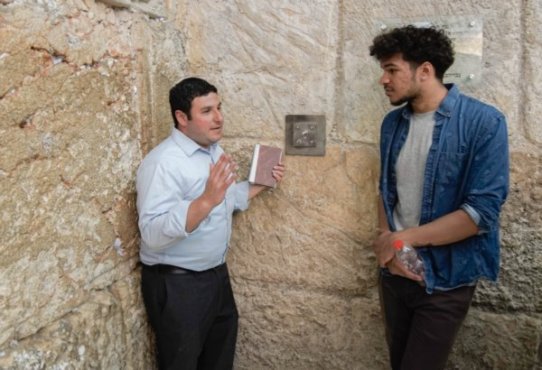On March 25, Amal Abu-Alkom—advocate for female entrepreneurship and education—will speak at Case Western Reserve University and meet with students
Last May, Jessica Stoner, then a first-year student at Case Western Reserve University, traveled overseas for the first time. She and her Weatherhead School of Management classmates visited Israel to learn first-hand how disadvantaged populations in the Middle East are creating economic opportunities.

There, they met with Amal Abu-Alkom, an advocate for improving the educational and career prospects for Israeli Bedouins, a historically economically disadvantaged community in the country’s southern region.
Abu-Alkom was denied a full education as a young woman and vowed to change the status quo for her daughter’s generation. She spoke to the students about earning her high school diploma against her parents’ wishes, enrolling in college, starting a nonprofit to boost female entrepreneurship and literacy, and founding a community with a “safe house” for women who want to control their futures.

Abu-Alkom’s story and activism resonated with Stoner, who was raised with her two siblings by a single mother who followed her own non-traditional path to earning a college degree.
“My small disadvantages have made me more aware of those faced by others—and how my interests can help make a difference,” said Stoner, a sophomore economics major and data analytics minor from Shelby, Ohio. “I want to apply my passion for finance and economics in ways to help people.”
This summer, Stoner will put her passion into motion: She and fellow Weatherhead School students will return to Israel to help establish a research study by delivering 100 tablets loaded with literacy software in Hebrew and English—the latter of which is not well known among Bedouins. The aim is to glean insights into how to improve career aspirations among women through education.
Ahead of this trip, Abu-Alkom will visit Case Western Reserve to discuss her mission and life’s work at the Tinkham Veale University Center Ballroom B on March 25 at 6 p.m. Her talk is free and open to the public.

The research and class are led by Daniel Shoag, a visiting assistant professor of economics at the Weatherhead School, who has won multiple small grants to fund the year-long project.
Tablet use data and pre- and post-study surveys will provide information on participants’ aspirations, current and desired education levels, self-esteem and other measures. Shoag and his students, including Stoner, will write a research paper based on the findings they hope also provide guidance for improving the efficiency of nonprofits.
“We want to see if we can create bigger connections for Bedouin women to the broader society and see if they have new career goals, views about themselves and their futures,” said Shoag, also an associate professor of public policy at the John F. Kennedy School of Government at Harvard University. “What we learn could help lead to larger initiatives of this kind.”
Israel is home to around 250,000 Bedouins, a traditionally nomadic population with higher levels of unemployment and lower levels of education than the country’s averages.

“Opportunities are limited, and they have trouble integrating economically,” said Shoag. “This problem disproportionally falls on girls.”
During Abu-Alkom’s three-day visit to Cleveland—which includes speeches to Global Cleveland and the Laura and Alvin Siegal Lifelong Learning Program—she also will meet with Stoner and other Weatherhead School students to fine-tune the research project.
“Amal has been an inspiration to us,” said Stoner. “It’s so beneficial for women and young people to see this kind of effort on their behalf that can also help others in the future.”
For more information, contact Daniel Robison at daniel.robison@case.edu.

